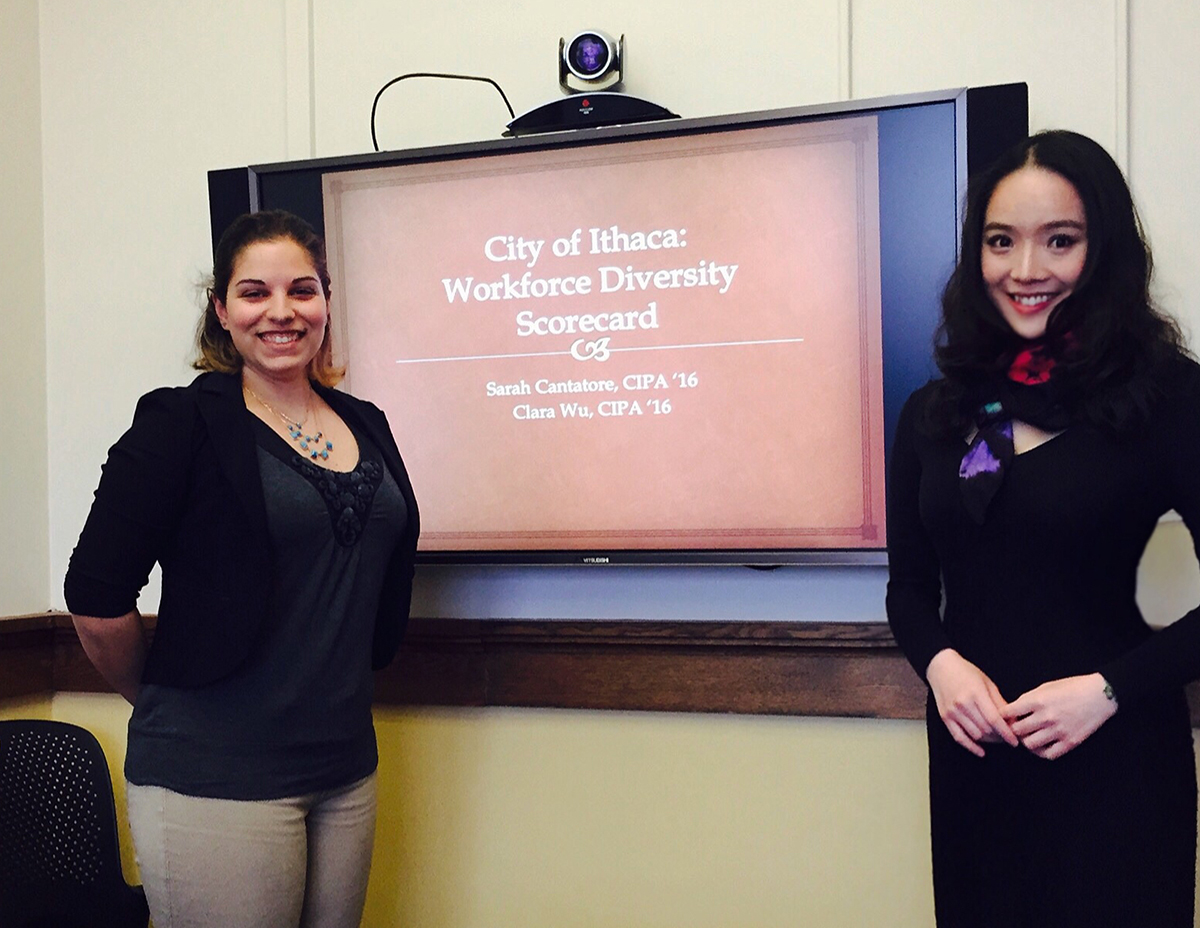Public affairs students put classroom skills into practice
By Susan Kelley

This fall, Clara Wu and Sarah Cantatore tackled the most complex project they had ever done as candidates for master’s degrees in public administration.
The students devised a “diversity scorecard” aimed at assessing how the City of Ithaca creates and maintains a diverse workforce. To design the scorecard, the students drafted and disseminated surveys, conducted focus groups, analyzed feedback and crunched numbers.
But they learned the most important take-away from a simple interaction.
During their first focus group, when they asked city employees and residents to group and rate words such as “respect,” “safety” and “accountability,” one participant said, “I’m not sure if I did this correctly.”
“Well, there are no right or wrong answers,” Cantatore replied. “We just want to see how people conceptualize this idea.”
When asked for feedback, several participants said knowing there were no wrong answers was helpful.
“So that was one of the first things we said to the next focus group,” Cantatore said. “Learning how to conduct a focus group was very valuable, for not just doing this type of work in the future, but also for interacting with the public and understanding how to be very clear in your messaging.”
It was one of many lessons learned this fall by aspiring public affairs experts during Cornell Institute for Public Affairs’ (CIPA) capstone class. The public engagement course is situated within Cornell’s larger mission of engaging with current global needs.
“The purpose of the capstone program is to provide students with experiences that will help them gain the knowledge and the skills they need to solve problems in the real world,” said Laurie Miller, associate director for CIPA Public Engagement and the capstone instructor.
Eight groups of students earning master’s degrees in public administration took on projects for nonprofit, for-profit and government organizations around the world, from Danby, New York, to Haiti, Honduras, Mexico and Panama. The students helped early-stage organizations in such areas as strategic planning and fundraising, while more established organizations got assistance with evaluation and analysis of longstanding policies and programs.
One group identified the ways in which the Danby Volunteer Fire District could optimize how it collects and transports water to fire scenes. Another assessed how Mexico’s Ministry of Health can deploy midwives and obstetric nurses to rural Chiapas so that fewer women die during childbirth. Climate Changers, a nonprofit in Ithaca, New York, that inspires individuals to reverse climate change, needed a concrete strategic plan that would help it grow from a concept into a functioning organization. Global Livingston Institute in Uganda asked a CIPA team to assess former child-soldiers’ most pressing physical, mental and vocational needs. Another group explored the benefits of a building a new port on the Panama Canal that could handle ships carrying cars, trucks and railroad cars.
No matter where their client organizations were based, all the students had to grasp the economic and political institutions that affected their clients, Miller said. “Students who come from an entirely different culture have to learn a lot at the beginning of their project if they’re going to have a chance to be successful in their project.”
The students overcome cultural barriers by discussing them with their clients, as well as with former and current CIPA students and faculty who have experience with the client organization and/or the geographical region. Some of the projects begun in this fall course may be carried over into the spring course; new teams will then have the opportunity to visit clients overseas and reassess on the ground.
On Dec. 17, Wu and Cantatore will present their proposed scorecard to the City of Ithaca Workforce Diversity Advisory Committee. The scorecard includes a comparison of the city’s workforce diversity to the diversity of its general population, and surveys, interviews and focus groups with employees.
While Wu and Cantatore accomplished a great deal of research, Miller said, each project met the client’s needs. “The products and presentations have to be great – really relevant and offer realistic recommendations – before they are given to the clients,” Miller said. “The capstone students have to achieve a certain level. And they do.”
Media Contact
Get Cornell news delivered right to your inbox.
Subscribe